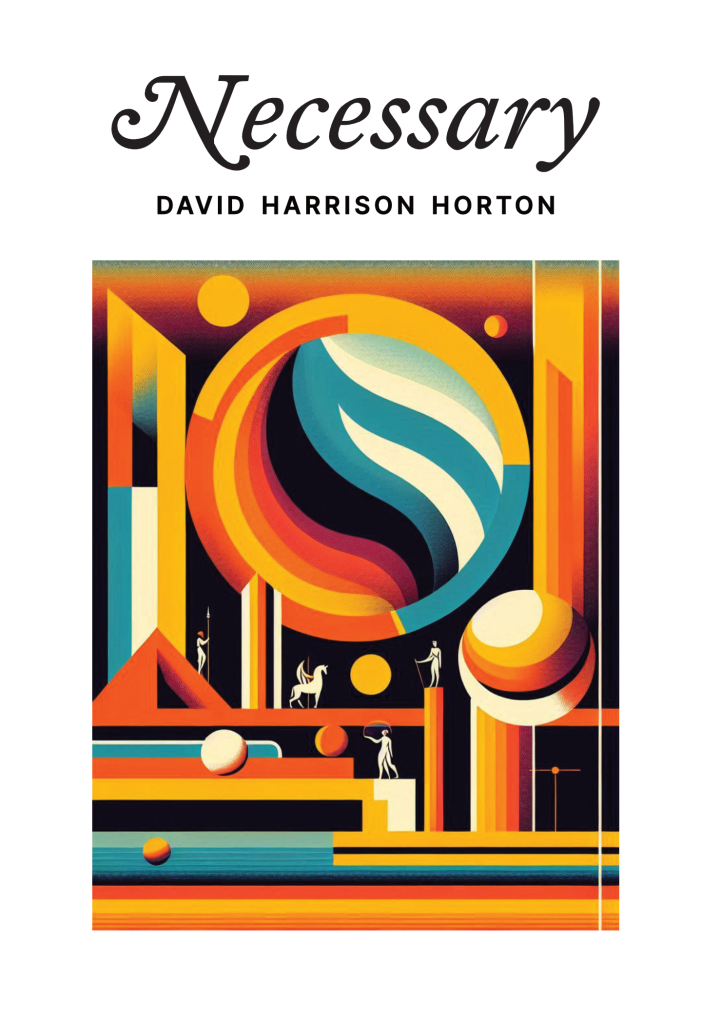by

David Harrison Horton’s Necessary is a poetic exploration of time, place, and connection. Drawing on sources as diverse as Babylonian creation myths, Carolingian history, Marco Polo, Paul Éluard, Elizabeth Willis, and Xinran, Horton layers fragments and imagery into a contemporary meditation on how we come to understand our place within inherited and unfolding narratives.
Structured in a fixed nine-line form, each poem places these elements in dialogue with the movements and longings of a recurring figure, Mr Lusk. As he walks the ‘well-beaten path’, Mr Lusk confronts the weight of history and heritage, echoing the universal need to reckon with what has come before.
With laconic precision, Horton’s voice allows each fragment to resonate, inviting readers to draw their own meaning from the intricate weave of past and present. Necessary is a compelling inquiry into how stories shape us – and how we, in turn, shape them.
Jordan Davis, American poet and former poetry editor of The Nation wrote:In a long poem composed of lyric fragments, Necessary shows us how pieces of a world coalesce and drift or are sundered apart. The poem’s vast range of reference gives this writing a sense of continuous, restless movement: the reader navigates time and site as the poem wrestles with itself “to question an account/traverse a distance.” Though David Harrison Horton is a writer of some restraint, Necessary nonetheless rings with urgency. It is by turns outraged, weary, yearning,—in short, always ready “to feel the complications/to feel.” At a most vexed and painful time in human history, this is indeed necessary writing: it enters the fray to truly, bravely “reckon a human position.”
Stephen Ratcliffe, American poet, critic, and author wrote:You will find a world in David Harrison Horton’s Necessary that you neither understand, nor see yourself in, nor know what to do with, and you will read to the end all the same. In this calm, lonely account, east Asia and North America are completely different and more or less the same, Biblical prophets and the Elizabethans do much the same work, the non sequiturs and disappointments of classic Chinese poetry (think Tao Yuangming or Liu Tsung-Yuan) are what the pool game Marco Polo was preparing us for. Or as Necessary puts it:
the books Mr. Lusk bought
the ones he intends to readIf you look closely, or if you read quickly, out of the corner of your eye, you will see the curious silhouette of an honest person. As the poet writes, “All right, but you have to promise not to cry.”
David Horton’s Necessary — its sharply chiseled nine-lines-per-page “sketches” arranged, apparently randomly, into 1-, 2-, 3- . . . 9-line “units” whose Cubistic shifts of attention from present tense concrete detail (“slippers and sandals / hammer-toed children / one pair of pants between”; “repetition of the factory floor/ sound of steel-toed shoes”) to thoughts moving through the mind (“The purpose of sketches / hagiography”; “a time not to speak of / a time”; “historical society placard / monument to the dead / votives and progression // proverbial historical”; “to be in a state too long / to be in a state”) -- is indeed necessary reading for anyone who wants to know what’s really going on in China these days.

